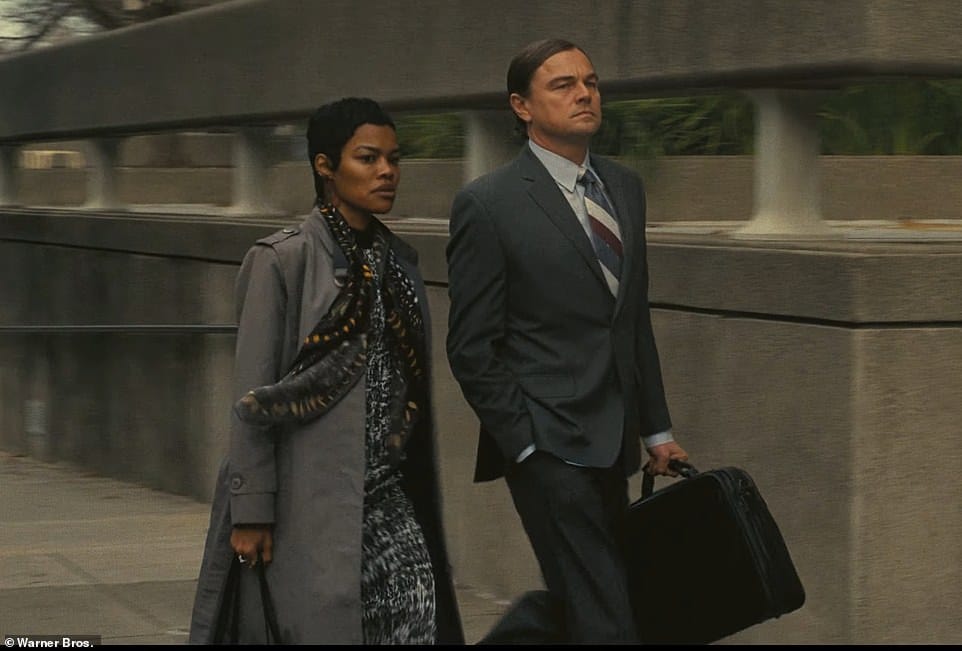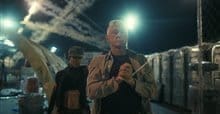"One Battle After Another" Guns for Glory

"Gun is American poem!” shouts the deranged Russian poet in a certain madcap `70s comedy whose title eludes me, and that’s one angle from which to regard Paul Thomas Anderson’s sprawling action/comedy/satire epic, “One Battle After Another”. You too may be sprawling in your seat wishing you'd programmed a pee break somewhere in its two hours and forty minutes, even as the plot harries you forward to the much celebrated action sequences in the thundering, concluding reels. But in due course you will have sat through a film that the critical elite has generally dubbed a master work from one of our true surviving auteurs.
It's a long-lived irony that the very cineaste audience that deplores the spread of handguns remains thoroughly blase' as to their avid use in resolving plot points (and anchoring one sheets). But in popular cinema culture firearms persistently bring a useful bang-bang no matter how higfallutin’ the story's authorship. And PTA certainly intended a popular movie, what with the prolonged, perilous car chase and the story-capping gunplay in this exceedingly well-acted tale of revolutionists and their discontents.
By all means, go see it. Even if you leave the theater agreeing with say, Paul Schrader’s Facebook takedown of two key performances, or agree with the the rare negging reviews, see it to support the entire span of career achievements by Anderson. The maker of such milestones as “Boogie Nights” (1997), “Magnolia” (1999), “There Will Be Blood” (2007) and “The Master " (2012) has been nominated for Best Director 11 times without a win, and has never spent nearly as much as the reported $115-plus million ”One Battle” cost. He may now be grumblingly judged by some in the industry if word of mouth fails to vault this new one 's box office by multiple millions past the opening weekend that topped out a little past $22 million.
Yes, also see it for the performances, of which more below. Should you be cinematographically inclined, see it in IMAX or even shoot for the throwback, expanded-frame technology of Vista Vision, currently available in but four American movie houses.
I saw it in a slightly beat, compact theater in Marina del Rey, under standard projection with an ordinary sound mix, my feet slowly adhering to the glistening floor. But once now-singleton-to-be Nicole Kidman had slunk onscreen to coo in my ear about the raptures of moviegoing, I was a contented enough patron. As were the fifteen or so people who turned up for this past Saturday's midday screening in a room built to hold a hundred.
The film’s intermittent laugh lines played a bit feebly in the echoey social distance we viewers shared, drawing scant reaction other than during the journey's tartest, most politicized moments, in which an ensemble of Trumpish, rich, old white fucks (members of a white supremacist cult called the Christmas Adventurers Club) sank into their racist, oligarchical, remorselessness.
Anderson’s sharp eavesdropping as they natter out their plutocratic, lethal emptiness, brought out the laughs most of us have been choking back as we crawl across the smoking wastes where democracy is resolutely being crushed. How I wish that last phrase was mere hyperbole; but the anger underlying the chortles from even our lonelyhearts audience– with the specter of real-life events throwing shade on any hope and change that might be churned up via the film's decades-spanning story of determined resistance--was the most vividly insurgent moment I’ve felt in a movie house since the whole MAGA fiasco began some nine years ago.
Once the shape-shifting plot has stuck the landing, you will have lived for a spell in the amiably funky and foggy (especially for the male lead) near past, as portrayed in this tragicomic and ultimately satisfying grab-bag that has a surfeit of likely-to-be-Oscar-nominated show ponies. It's a big-hearted tale that eschews despair to favor lovingness, and unveils just enough plot to steer us through that indulgent length that says, box office be damned.
We are hustled straight into the kinetic (yes, that current buzzword) opening , just steps behind relative newcomer Teyana Taylor, who arrives as a music star in her own right. She's a physical presence whose every move reveals her original skill set as a precociously gifted choreographer for the likes of Beyonce. Her sheer potency at displaying zeal for all the tasks PTA has demanded of her thrusts her irrevocably into our consciousness. It would be derelict not to mention the exceptionally curvaceous physique that bewitches we viewers right along with Sean Penn as an anti-hero mad dog of war who might be called Kubrickian-with-tweaks--say, George C. Scott on molly?
As the randy girl boss running the big guerrilla-style bust-out of detained migrants that turbocharges the film’s opening half-hour, she nails an arrival to stardom. Some might wish PTA as screenwriter had handed her a few less f-bombs to uncork; they drain, rather than enforce, her portrayal of a leader’s lethality. George Bernard Shaw is said to have critiqued his wife’s deployment of some essayed profanity with, “The words are there but the music is not”; in truth it would require the world’s most Masterful Thespian to sell that many cusses. (One refers back in personal memory to a pointless summer job alongside an incessantly profane chap we dubbed--his given name is altered here–“Spike Fuck Sepulski Fuck”.

Based on a character from Thomas Pynchon’s decidedly lesser 1990 novel “Vineland,” she’s renamed from the book’s Frenesi Gates to become the film’s Perfidia Beverly Hills, but in her fling with Leo's green comrade (at that point known as Ghetto Pat) fulfills her depiction from the book: “She came into his life like a whole gang of outlaws.” In this film which is more about parenthood than it is about delivering the stacked incidents that unfold throughout an energetically shot tapestry of violence, she will birth a daughter in the first act. Then, as Justin Chang approvingly writes in The New Yorker, “Perfidia vanishes for good, and you miss her terribly; Taylor so vivid that her absence becomes a presence.”
In the inevitable three-card monte of guessing at the Oscars sweepstakes, Sean Penn could indeed be overdue. His five noms already yielded two Best Actor wins, for the anguished sagas of “Mystic River” (2003) and “Milk” (2008).
But one could argue his performance as Col. Lockjaw (the Pynchonesque names are saddlebags the players hump with willing elan) emerges as his most layered. Although the character’s walk and gruffness echo his cartoonish moniker, his frenetic lust toward Perfiodia carries a desperate, half-buried intensity; just as intriguing is his Hegsethean zeal to join the corrupt, lubricious thrills of the Christmas Adventurers as they're wielding their covert power.
Lockjaw's empty ambition brings him to a place where Penn's muted (and often mute) solo scene work rewards our most probing scrutiny—exactly what is it that makes people break all the way bad? (You know, Stephen Miller, Russell Vought, shithouse-rat bad.) There are at least two striking reveals that Lockjaw executes to surprise us, but the character's gift to this film is in Penn's nuanced examination of wanting too much, too fervently. Yet even as he uncloaks unspeakable mysteries of his twisted fascist mentality, he keeps a flicker of humanity beneath. (In Kubrickian terms, we watch as he goes from Scott’s Buck Turgidson to…Hal 9000?)
DiCaprio, for his part, is the the director’s chief helpmate and team player, on and off screen, He's known latterly as Bob Ferguson, an emblem of his ineffectuality. (Earlier, as Ghetto Pat, he's a quickly sketched figure who makes bombs and seems to be an echo of real-life 60s radicals, lifted judiciously from Anderson and DiCaprio's much-admired secondary source text, Bryan Burroughs’s deeply reported “Days of Rage”). DiCaprio immerses in perhaps his most inventive performance, wrangling Bob’s loving paternity into a comic presence that uses some of the woe-adjacent Buster Keaton physicality that animated his broker bro in “Wolf of Wall Street”.
Near-magical scene partner and physical-business champ is Benicio del Toro, bringing his never-gets-old confidence and creased-eyelids charm. He has for years taught Hollywood that if you’re looking for a master of space and time who can readily add whimsy (you’ll see, just wait), he’s your man, and probably one of thespianism’s best bulwarks against the brutal notion of AI actors.
Shared and solo interviews by PTA and DiCaprio reveal the actor to be what baseball managers call a “good clubhouse guy”. In a celebratory bro-down interview with the Los Angeles Times (Rolling Stone ‘s David Fear has a good one as well) , we see Leo right at home with his director’s assessment that the crucial role, and the film’s keynote performance, is Chase Infiniti as Willa. As the mixed-race daughter bearing a limpid beauty that’s ever so watchable yet never dilutes a banked ferocity that’s DNA deep, the young actress is a still-blooming discovery who swings all the emotions and plot machinations into a centripetal path toward the film’s ultimately deep, but hardly cloying, sweetness. Her scenes with the ever-resourceful and convincing Regina Hill as a matriarchal demiurge are another plank in exemplifying the generational love that can exist for society’s outsiders in a threatening world.
After watching DiCaprio rise from his battered lassitude into a wildly capering action scenario in his bathrobe, it’s easy to neglect admiring the role’s hidden depths. Perhaps, as highly observant actors often do with brilliant directors, he’s serving as Anderson’s autobiographical stand-in. Making a good many of his fifty years melt away during the early innings, he starts out as the fervent, eager kid we first met onscreen. He becomes, in the latter stages, the curmudgeonly yet loving dad who happens to have a mixed -race daughter. (And as such a dad serves as an ummistakable cognate figure alongside Anderson, who has four kids of his own with Maya Rudolph.)
There will be more to say as this movie grinds uphill in the marketplace. Jonny Greenwood’s score is inventive (lots of plinking piano notes suspended in our ears) and by now, after multiple collaborations, is expertly attuned to the moods and visuals of PTA. The needle drops that include Gil Scott-Heron are diverse and energizing, and--however on the nose it may be--the closing-moments song by a certain late lamented singer-songwriter shows its worth one more time. It’s all the more enriching for being used in a contrapuntal mood that here is located entire worlds away from how said song (nope, not outing the title!) was used as the opposite kind of harbinger when Jonathan Demme made rich use of it in “Silence of the Lambs."
If Pynchon’s “Vineland” is a fluttery late-period piece of work, shot through with hipster jive and a certain freak-flag nostalgia, it sets up an Andersonian sense of quirk that bestrides this entire adventure in cinema. It boasts a slightly oracular epigraph from lyrics by a blues artist (formerly, a credentialed pugilist , a gent I once wrote liner notes for):
“Every dog has its day
And a good dog
just might have two days.
--Johnny Copeland
There will be times and places to dig into this movie as some sort of curative national tonic—or is it a warning tocsin? It may indeed help in its way, perhaps serving as a goad to push back harder on what’s happening our society. And as part of a recent run of big swings by Warner Brothers as a studio, it makes its own bold declaration that such earnest filmmaking can survive. Indiewire’s David Ehrlich put it well: "Hollywood has collapsed around [PTA], despite his best efforts to preserve its celluloid magic. …he’s doing his thing on the fringes of a studio system that’s crumbling faster than his entire generation of name-brand auteurs can fortify it with new films."
PTA has recently asserted he’s an optimist, but maybe he’s sooner an “ameliorist”—one who wants to make things better through action. As he closed his chat with Leo and Rolling Stone’s Fear: “...How do you not give up? whether you’re talking about big things, finding one battle after another for the state of our world, or you’re talking about daily battles, from getting up in the morning and just getting your coat and getting your kids to school and brushing your teeth and stubbing your toe. I mean, that’s the job. Yes, fight these daily battles. Be nice. Keep your head down. Get on to the next fight, but don’t give up.”


Comments ()